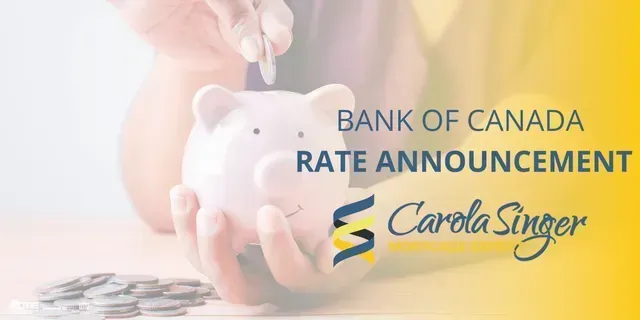MORTGAGE ARTICLES
ALL POSTS

Bank of Canada holds policy rate at 2¾%. FOR IMMEDIATE RELEASE Media Relations Ottawa, Ontario April 16, 2025 The Bank of Canada today maintained its target for the overnight rate at 2.75%, with the Bank Rate at 3% and the deposit rate at 2.70%. The major shift in direction of US trade policy and the unpredictability of tariffs have increased uncertainty, diminished prospects for economic growth, and raised inflation expectations. Pervasive uncertainty makes it unusually challenging to project GDP growth and inflation in Canada and globally. Instead, the April Monetary Policy Report (MPR) presents two scenarios that explore different paths for US trade policy. In the first scenario, uncertainty is high but tariffs are limited in scope. Canadian growth weakens temporarily and inflation remains around the 2% target. In the second scenario, a protracted trade war causes Canada’s economy to fall into recession this year and inflation rises temporarily above 3% next year. Many other trade policy scenarios are possible. There is also an unusual degree of uncertainty about the economic outcomes within any scenario, since the magnitude and speed of the shift in US trade policy are unprecedented. Global economic growth was solid in late 2024 and inflation has been easing towards central bank targets. However, tariffs and uncertainty have weakened the outlook. In the United States, the economy is showing signs of slowing amid rising policy uncertainty and rapidly deteriorating sentiment, while inflation expectations have risen. In the euro area, growth has been modest in early 2025, with continued weakness in the manufacturing sector. China’s economy was strong at the end of 2024 but more recent data shows it slowing modestly. Financial markets have been roiled by serial tariff announcements, postponements and continued threats of escalation. This extreme market volatility is adding to uncertainty. Oil prices have declined substantially since January, mainly reflecting weaker prospects for global growth. Canada’s exchange rate has recently appreciated as a result of broad US dollar weakness. In Canada, the economy is slowing as tariff announcements and uncertainty pull down consumer and business confidence. Consumption, residential investment and business spending all look to have weakened in the first quarter. Trade tensions are also disrupting recovery in the labour market. Employment declined in March and businesses are reporting plans to slow their hiring. Wage growth continues to show signs of moderation. Inflation was 2.3% in March, lower than in February but still higher than 1.8% at the time of the January MPR. The higher inflation in the last couple of months reflects some rebound in goods price inflation and the end of the temporary suspension of the GST/HST. Starting in April, CPI inflation will be pulled down for one year by the removal of the consumer carbon tax. Lower global oil prices will also dampen inflation in the near term. However, we expect tariffs and supply chain disruptions to push up some prices. How much upward pressure this puts on inflation will depend on the evolution of tariffs and how quickly businesses pass on higher costs to consumers. Short-term inflation expectations have moved up, as businesses and consumers anticipate higher costs from trade conflict and supply disruptions. Longer term inflation expectations are little changed. Governing Council will continue to assess the timing and strength of both the downward pressures on inflation from a weaker economy and the upward pressures on inflation from higher costs. Our focus will be on ensuring that Canadians continue to have confidence in price stability through this period of global upheaval. This means we will support economic growth while ensuring that inflation remains well controlled. Governing Council will proceed carefully, with particular attention to the risks and uncertainties facing the Canadian economy. These include: the extent to which higher tariffs reduce demand for Canadian exports; how much this spills over into business investment, employment and household spending; how much and how quickly cost increases are passed on to consumer prices; and how inflation expectations evolve. Monetary policy cannot resolve trade uncertainty or offset the impacts of a trade war. What it can and must do is maintain price stability for Canadians. Information note The next scheduled date for announcing the overnight rate target is June 4, 2025. The Bank will publish its next MPR on July 30, 2025. Read the April 16th, 2025 Monetary Report

Chances are if the title of this article piqued your interest enough to get you here, your family is probably growing. Congratulations! If you’ve thought now is the time to find a new property to accommodate your growing family, but you’re unsure how your parental leave will impact your ability to get a mortgage, you’ve come to the right place! Here’s how it works. When you work with an independent mortgage professional, it won’t be a problem to qualify your income on a mortgage application while on parental leave, as long as you have documentation proving that you have guaranteed employment when you return to work. A word of caution, if you walk into your local bank to look for a mortgage and you disclose that you’re currently collecting parental leave, there’s a chance they’ll only allow you to use that income to qualify. This reduction in income isn’t ideal because at 55% of your previous income up to $595/week, you won’t be eligible to borrow as much, limiting your options. The advantage of working with an independent mortgage professional is choice. You have a choice between lenders and mortgage products, including lenders who use 100% of your return-to-work income. To qualify, you’ll need an employment letter from your current employer that states the following: Your employer’s name preferably on the company letterhead Your position Your initial start date to ensure you’ve passed any probationary period Your scheduled return to work date Your guaranteed salary For a lender to feel confident about your ability to cover your mortgage payments, they want to see that you have a position waiting for you once your parental leave is over. You might also be required to provide a history of your income for the past couple of years, but that is typical of mortgage financing. Whether you intend to return to work after your parental leave is over or not, once the mortgage is in place, what you decide to do is entirely up to you. Mortgage qualification requires only that you have a position waiting for you. If you have any questions about this or anything else mortgage-related, please connect anytime. It would be a pleasure to work with you.

When looking to qualify for a mortgage, typically, a lender will want to review four areas of your mortgage application: income, credit, downpayment/equity and the property itself. Assuming you have a great job, excellent credit, and sufficient money in the bank to qualify for a mortgage, if the property you’re looking to purchase isn’t in good condition, if you don't have a plan, you might get some pushback from the lender. The property matters to the lender because they hold it as collateral if you default on your mortgage. As such, you can expect that a lender will make every effort to ensure that any property they finance is in good repair. Because in the rare case that you happen to default on your mortgage, they want to know that if they have to repossess, they can sell the property quickly and recoup their money. So when assessing the property as part of any mortgage transaction, an appraisal is always required to establish value. If your mortgage requires default mortgage insurance through CMHC, Sagen (formerly Genworth), or Canada Guaranty, they’ll likely use an automated system to appraise the property where the assessment happens online. A physical appraisal is required for conventional mortgage applications, which means an appraiser will assess the property on-site. So why is this important to know? Well, because even if you have a great job, excellent credit, and money in the bank, you shouldn’t assume that you’ll be guaranteed mortgage financing. A preapproval can only take you so far. Once the mortgage process has started, the lender will always assess the property you’re looking to purchase. Understanding this ahead of time prevents misunderstandings and will bring clarity to the mortgage process. Practically applied, if you’re attempting to buy a property in a hot housing market and you go in with an offer without a condition of financing, once the appraisal is complete, if the lender isn’t satisfied with the state or value of the property, you could lose your deposit. Now, what happens if you’d like to purchase a property that isn’t in the best condition? Being proactive includes knowing that there is a purchase plus improvements program that can allow you to buy a property and include some of the cost of the renovations in the mortgage. It’s not as simple as just increasing the mortgage amount and then getting the work done, there’s a process to follow, but it’s very doable. So if you have any questions about financing your next property or potentially using a purchase plus improvements to buy a property that needs a little work, please connect anytime. It would be a pleasure to walk you through the process.

It’s a commonly held belief that if you’ve made your mortgage payments on time throughout the entirety of your mortgage term, that the lender is somehow obligated to renew your mortgage. The truth is, a lender is never under any obligation to renew your mortgage. When you sign a mortgage contract, the lender draws it up for a defined time, so when that term comes to an end, the lender has every right to call the loan. Now, granted, most lenders are happy to renew your mortgage, but several factors could come into play to prevent this from happening, including the following: You’ve missed mortgage payments over the term. The lender becomes aware that you’ve recently claimed bankruptcy. The lender becomes aware that you’re going through a separation or divorce. The lender becomes aware that you lost your job. Someone on the initial mortgage contract has passed away. The lender no longer likes the economic climate and/or geographic location of your property. The lender is no longer licensed to lend money in Canada. Again, while most lenders are happy to renew your mortgage at the end of the term, you need to understand that they are not under any obligation to do so. So how do you protect yourself? Well, the first plan of action is to get out in front of things. At least 120 days before your mortgage term expires, you should be speaking with an independent mortgage professional to discuss all of your options. By giving yourself this lead time and seeking professional advice, you put yourself in the best position to proactively look at all your options and decide what’s best for you. When assessing your options at the time of renewal, even if the lender offers you a mortgage renewal, staying with your current lender is just one of the options you have. Just because your current lender was the best option when you got your mortgage doesn’t mean they are still the best option this time around. The goal is to assess all your options and choose the one that lowers your overall cost of borrowing. It’s never a good idea to sign a mortgage renewal without looking at all your options. Also, dealing with an independent mortgage professional instead of directly with the lender ensures you have someone working for you, on your team, instead of seeking guidance from someone with the lender’s best interest in mind. So if you have a mortgage that’s up for renewal, whether you’re being offered a renewal or not, the best plan of action is to protect yourself by working with an independent mortgage professional. Please connect anytime; it would be a pleasure to work with you!

You’ve most likely heard that there are two certainties in life; death and taxes. Well, as it relates to your mortgage, the single certainty is that you will pay back what you borrow, plus interest. With that said, the frequency of how often you make payments to the lender is somewhat up to you! The following looks at the different types of payment frequencies and how they impact your mortgage. Here are the six payment frequency types Monthly payments – 12 payments per year Semi-Monthly payments – 24 payments per year Bi-weekly payments – 26 payments per year Weekly payments – 52 payments per year Accelerated bi-weekly payments – 26 payments per year Accelerated weekly payments – 52 payments per year Options one through four are straightforward and designed to match your payment frequency with your employer. So if you get paid monthly, it makes sense to arrange your mortgage payments to come out a few days after payday. If you get paid every second Friday, it might make sense to have your mortgage payments match your payday. However, options five and six have that word accelerated before the payment frequency. Accelerated bi-weekly and accelerated weekly payments accelerate how fast you pay down your mortgage. Choosing the accelerated option allows you to lower your overall cost of borrowing on autopilot. Here’s how it works. With the accelerated bi-weekly payment frequency, you make 26 payments in the year. Instead of dividing the total annual payment by 26 payments, you divide the total yearly payment by 24 payments as if you set the payments as semi-monthly. Then you make 26 payments on the bi-weekly frequency at the higher amount. So let’s use a $1000 payment as the example: Monthly payments formula: $1000/1 with 12 payments per year. A payment of $1000 is made once per month for a total of $12,000 paid per year. Semi-monthly formula: $1000/2 with 24 payments per year. A payment of $500 is paid twice per month for a total of $12,000 paid per year. Bi-weekly formula: $1000 x 12 / 26 with 26 payments per year. A payment of $461.54 is made every second week for a total of $12,000 paid per year. Accelerated bi-weekly formula: $1000/2 with 26 payments per year. A payment of $500 is made every second week for a total of $13,000 paid per year. You see, by making the accelerated bi-weekly payments, it’s like you end up making two extra payments each year. By making a higher payment amount, you reduce your mortgage principal, which saves interest on the entire life of your mortgage. The payments for accelerated weekly payments work the same way. It’s just that you’d be making 52 payments a year instead of 26. By choosing an accelerated option for your payment frequency, you lower the overall cost of borrowing by making small extra payments as part of your regular payment schedule. Now, exactly how much you’ll save over the life of your mortgage is hard to nail down. Calculations are hard to do because of the many variables; mortgages come with different amortization periods and terms with varying interest rates along the way. However, an accelerated bi-weekly payment schedule could reduce your amortization by up to three years if maintained throughout the life of your mortgage. If you’d like to look at some of the numbers as they relate to you and your mortgage, please don’t hesitate to connect anytime; it would be a pleasure to work with you.

Bank of Canada reduces policy rate by 25 basis points to 2¾% FOR IMMEDIATE RELEASE Media Relations Ottawa, Ontario March 12, 2025 The Bank of Canada today reduced its target for the overnight rate to 2.75%, with the Bank Rate at 3% and the deposit rate at 2.70%. The Canadian economy entered 2025 in a solid position, with inflation close to the 2% target and robust GDP growth. However, heightened trade tensions and tariffs imposed by the United States will likely slow the pace of economic activity and increase inflationary pressures in Canada. The economic outlook continues to be subject to more-than-usual uncertainty because of the rapidly evolving policy landscape. After a period of solid growth, the US economy looks to have slowed in recent months. US inflation remains slightly above target. Economic growth in the euro zone was modest in late 2024. China’s economy has posted strong gains, supported by government policies. Equity prices have fallen and bond yields have eased on market expectations of weaker North American growth. Oil prices have been volatile and are trading below the assumptions in the Bank’s January Monetary Policy Report (MPR). The Canadian dollar is broadly unchanged against the US dollar but weaker against other currencies. Canada’s economy grew by 2.6% in the fourth quarter of 2024 following upwardly revised growth of 2.2% in the third quarter. This growth path is stronger than was expected at the time of the January MPR. Past cuts to interest rates have boosted economic activity, particularly consumption and housing. However, economic growth in the first quarter of 2025 will likely slow as the intensifying trade conflict weighs on sentiment and activity. Recent surveys suggest a sharp drop in consumer confidence and a slowdown in business spending as companies postpone or cancel investments. The negative impact of slowing domestic demand has been partially offset by a surge in exports in advance of tariffs being imposed. Employment growth strengthened in November through January and the unemployment rate declined to 6.6%. In February, job growth stalled. While past interest rate cuts have boosted demand for labour in recent months, there are warning signs that heightened trade tensions could disrupt the recovery in the jobs market. Meanwhile, wage growth has shown signs of moderation. Inflation remains close to the 2% target. The temporary suspension of the GST/HST lowered some consumer prices, but January’s CPI was slightly firmer than expected at 1.9%. Inflation is expected to increase to about 2½% in March with the end of the tax break. The Bank’s preferred measures of core inflation remain above 2%, mainly because of the persistence of shelter price inflation. Short-term inflation expectations have risen in light of fears about the impact of tariffs on prices. While economic growth has come in stronger than expected, the pervasive uncertainty created by continuously changing US tariff threats is restraining consumers’ spending intentions and businesses’ plans to hire and invest. Against this background, and with inflation close to the 2% target, Governing Council decided to reduce the policy rate by a further 25 basis points. Monetary policy cannot offset the impacts of a trade war. What it can and must do is ensure that higher prices do not lead to ongoing inflation. Governing Council will be carefully assessing the timing and strength of both the downward pressures on inflation from a weaker economy and the upward pressures on inflation from higher costs. The Council will also be closely monitoring inflation expectations. The Bank is committed to maintaining price stability for Canadians. Information note The next scheduled date for announcing the overnight rate target is April 16, 2025. The Bank will publish its next full outlook for the economy and inflation, including risks to the projection, in the MPR at the same time.

One of the benefits of working with an independent mortgage professional is having lots of great financing options! Rather than dealing with a single lender with one set of products, independent mortgage professionals work with multiple lenders who offer a wide selection of mortgage financing options that provide more choice. Increased choice in mortgage products is beneficial when your situation isn’t “normal,” or you don’t quite fit the profile of a standard buyer. Purchasing a new construction home through an assignment contract would be a great example of this. Purchasing a new construction home through an assignment contract can be tricky as not every lender wants the added perceived risk of dealing with this type of transaction. Most of these lenders won’t come out and say it; instead, they add a significant list of qualifying conditions to make the process harder. The good news is, there are lenders available exclusively through the broker channel that have favourable policies for assignment purchases. Here are some of the highlights: All standard purchase qualifications apply, including applicable income verification, established credit, and required downpayment Assignments can be at the original purchase price or current market value Minimum 620 beacon score with no previous bankruptcies or consumer proposals The full downpayment must come from the purchaser and not include any incentives from the seller. As far as documentation goes, the lender will want to see the original purchase agreement signed by all parties, the MLS listing, the assignment agreement signed by the builder, the original purchaser, and the new buyer. The lender will also want to see the side agreement between the original purchaser and the new buyer, including the amended purchase price. The lender will want to substantiate the value through a full appraisal. Now, as every situation is different, this list of conditions is in no way exhaustive but meant to show that assigning a new construction purchase contract is doable while highlighting some of the terms necessary to secure financing. If you’re looking to purchase new construction through an assignment contract, or if you’d like to discuss purchasing a home through traditional means, please connect anytime! It would be a pleasure to outline the mortgage products on the market that won’t limit your financing options!

Refinancing your mortgage can be a smart financial move, but how do you know if it’s the right time? Whether you’re looking to lower your monthly payments, access home equity, or consolidate debt, refinancing can offer valuable benefits. Here are five key signs that it might be the right time to refinance your mortgage in Canada. 1. Interest Rates Have Dropped One of the most common reasons Canadians refinance is to secure a lower interest rate. Even a small decrease in your mortgage rate can lead to significant savings over time. If rates have dropped since you took out your mortgage, refinancing could help you reduce your monthly payments and save thousands in interest. ✅ Tip: Check with your mortgage broker to compare your current rate with today’s market rates. 2. Your Financial Situation Has Improved If your credit score has increased or your income has stabilized since you first got your mortgage, you might qualify for better loan terms. Lenders offer lower rates and better conditions to borrowers with strong financial profiles. ✅ Tip: If you’ve paid off debts, improved your credit score, or increased your savings, refinancing could work in your favour. 3. You Want to Consolidate High-Interest Debt Carrying high-interest debt from credit cards, personal loans, or lines of credit? Refinancing can help consolidate those debts into your mortgage at a much lower interest rate. This can make monthly payments more manageable and reduce the overall cost of borrowing. ✅ Tip: Make sure the savings from refinancing outweigh any prepayment penalties or fees. 4. You Need to Free Up Cash for a Major Expense Many Canadians refinance to access their home’s equity for renovations, education costs, or major life expenses. With home values rising in many areas, a refinance could help you tap into that value while still keeping manageable payments. ✅ Tip: Consider a home equity line of credit (HELOC) if you need flexible access to funds. 5. Your Mortgage Term is Ending, and You Want Better Terms If your mortgage is up for renewal, it’s the perfect time to explore refinancing options. Instead of simply accepting your lender’s renewal offer, compare rates and terms to see if you can get a better deal elsewhere. ✅ Tip: A mortgage broker can help you shop around and negotiate better terms on your behalf. Is Refinancing Right for You? Refinancing isn’t always the best move—there can be penalties for breaking your current mortgage, and not all savings are worth the switch. However, if you relate to any of the five signs above, it’s worth discussing your options with a mortgage professional. Thinking about refinancing? Let’s chat and find the best option for you!

If you're not all that familiar with the ins and outs of mortgage financing, the term "second mortgage" might cause a bit of confusion. Many people incorrectly assume that a second mortgage is arranged when your first term is up for renewal or when you sell your first home. They think that the next mortgage you get is your "second mortgage." This is not the case. A second mortgage is an additional mortgage on a single property, not the second mortgage you get in your lifetime. When you borrow money to buy a house, your lawyer or notary will register your mortgage on the property title in what is called first position. This means that your mortgage lender has the first claim against the sale proceeds if you sell your property. If you happen to default on your mortgage, this is the security the lender has in repossessing your property. A second mortgage falls in behind the first mortgage on your property title. When you sell your property, the lawyers will use the sale proceeds to pay off your mortgages in sequence, the first position mortgage is paid out first, and the second mortgage is paid out second. After both mortgages are paid off completely, you get the remaining equity. When you secure a second mortgage, you continue making payments on your first mortgage as per your mortgage agreement. You must also then fulfill the terms of the second mortgage. So why would you want a second mortgage? Well, a second mortgage comes in handy when you're looking to access some of your home equity, but you either have excellent terms on your first mortgage that you don't want to break, or you’d incur a huge penalty to break your first mortgage. Instead of refinancing the first mortgage, a second mortgage can be a better option. A second mortgage is often used as a short-term debt consolidation tool to help provide you with better cash flow. If you’ve accumulated a considerable amount of high-interest unsecured debt, and you have equity in your home, you can secure a second mortgage to lower your overall cost of borrowing. If you'd like to know more about how a second mortgage works, or if you'd like to discuss anything related to mortgage financing, please connect anytime!


